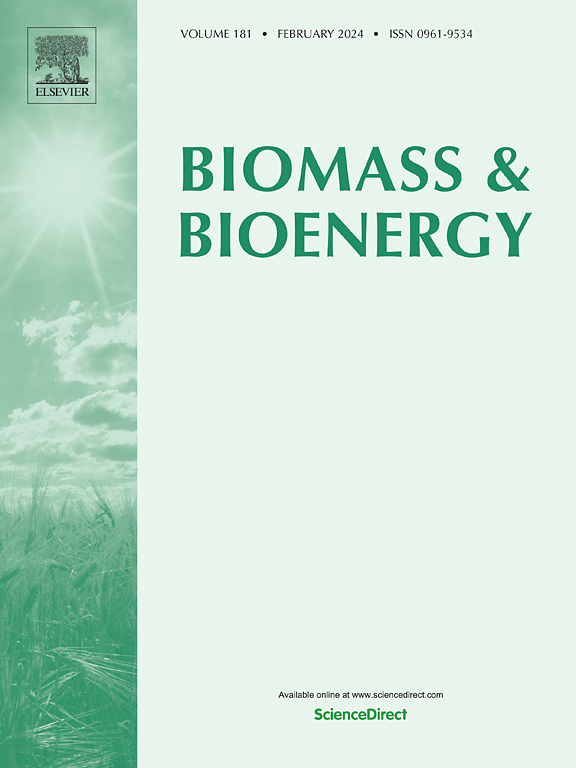利用地球上丰富的铝盐有效地将淀粉食物垃圾转化为生物基乙酰丙酸盐产品:性能和经济性
IF 5.8
2区 生物学
Q1 AGRICULTURAL ENGINEERING
引用次数: 0
摘要
本研究首次展示了利用廉价且富含地球资源的金属盐催化剂将富含淀粉的食物废料(如大米、马铃薯和面包)转化为含氧化学品(即乙酰丙酸甲酯)的实例。对多种金属盐进行了系统测试,Al2(SO4)3 在醇解反应中表现出最佳的催化反应活性,在甲醇/水混合溶剂中转化大米废料粉末时,ML 的产率为 51.5 摩尔%。一系列不同的厨余成功转化为 ML,产物收率各不相同(17.3-51.5 摩尔%)。对反应参数进行了系统优化,以揭示其对产品收率的影响。还提出了催化剂回收程序,以回收和再利用系统中涉及的试剂。最后,还对该系统进行了初步的经济分析。本文章由计算机程序翻译,如有差异,请以英文原文为准。

Efficient transformation of starch food wastes into bio-based levulinate products over earth-abundant aluminum salts: Performances and economics
This study presented the first example on the transformation of starch-rich food wastes (e.g. rice, potato, bread) into oxygenated chemicals, namely methyl levulinate (ML), over the cheap and earth-abundant metal salt catalysts. A variety of metal salts were systematically tested and Al2(SO4)3 exhibited the best catalytic reactivity for the alcoholysis reaction, offering a 51.5 mol% yield of ML in the conversion of rice waste powder in the methanol/water mixture solvent. A series of different food wastes were successfully converted to ML with different product yields (17.3–51.5 mol%). The reaction parameters were systematically optimized to reveal their influences on the product yields. The catalyst recycling procedure was proposed to recycle and reuse the reagents involved in the system. Finally, a preliminary economic analysis of the system was also included.
求助全文
通过发布文献求助,成功后即可免费获取论文全文。
去求助
来源期刊

Biomass & Bioenergy
工程技术-能源与燃料
CiteScore
11.50
自引率
3.30%
发文量
258
审稿时长
60 days
期刊介绍:
Biomass & Bioenergy is an international journal publishing original research papers and short communications, review articles and case studies on biological resources, chemical and biological processes, and biomass products for new renewable sources of energy and materials.
The scope of the journal extends to the environmental, management and economic aspects of biomass and bioenergy.
Key areas covered by the journal:
• Biomass: sources, energy crop production processes, genetic improvements, composition. Please note that research on these biomass subjects must be linked directly to bioenergy generation.
• Biological Residues: residues/rests from agricultural production, forestry and plantations (palm, sugar etc), processing industries, and municipal sources (MSW). Papers on the use of biomass residues through innovative processes/technological novelty and/or consideration of feedstock/system sustainability (or unsustainability) are welcomed. However waste treatment processes and pollution control or mitigation which are only tangentially related to bioenergy are not in the scope of the journal, as they are more suited to publications in the environmental arena. Papers that describe conventional waste streams (ie well described in existing literature) that do not empirically address ''new'' added value from the process are not suitable for submission to the journal.
• Bioenergy Processes: fermentations, thermochemical conversions, liquid and gaseous fuels, and petrochemical substitutes
• Bioenergy Utilization: direct combustion, gasification, electricity production, chemical processes, and by-product remediation
• Biomass and the Environment: carbon cycle, the net energy efficiency of bioenergy systems, assessment of sustainability, and biodiversity issues.
 求助内容:
求助内容: 应助结果提醒方式:
应助结果提醒方式:


